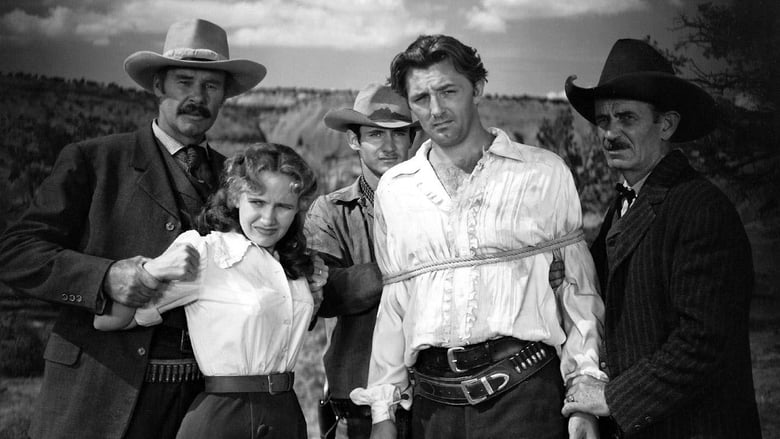
Released the same year as Robert Mitchum gave his career defining performance in Jacques Tourneur’s quintessential film noir masterpiece Out Of The Past (1947), Pursued (1947) sees Mitchum appearing in a film noir infused western at RKO studios for legendary director Raoul Walsh. In both films Mitchum plays a tough guy whose life has been derailed by mitigating circumstances. These tales of love, betrayal, and vigilante justice are structured as a series of flashbacks in the form of a confession to a lover. Where Tourneur turns towards pulpy detective novels the milieu of Out Of The Past Walsh opts instead for Greek Tragedy.
Pursued was written by Niven Busch as a thematic retread of his novel Duel In The Sun (1944). Busch successfully finds a canvas in the western for the kind of complex tragedies associated with Shakespeare. The moral complexity and intricate relationships of the characters in Pursued lend the project well to the highly expressionistic style of film noir. Walsh and cinematographer James Wong Howe take full advantage of this and create the darkest and most sinister western of Walsh’s career at that point. Like the protagonists in Sophocles’ plays Mitchum’s character Jeb Rand seems destined to die bloodily which is communicated by Walsh’s framing and use of deep shadows that keep Jeb Rand enveloped in darkness.
Unlike most westerns of the forties Pursued is a film about a mystery whose answers are hidden beneath the childhood traumas of the protagonist. The scenes where Jeb Rand recalls his earliest and most traumatic memory are startling in their minimalism. All Walsh shows us is all Rand can recall: a pair of boots with ornate spurs pacing back and forth as flashes of light strike like lightning. It’s clear to the viewer before it is clear to Jeb Rand that what these images represent is some highly abstracted gunfight.
While the technique described above can be traced back to the earlier German films of Fritz Lang the Freudian sense of doom and longing for destruction in Pursued can be traced back to Robert Siodmak’s The Killers (1946). Jeb Rand describes himself as being pursued his whole life feeling as though someone were out to kill him. Of course he isn’t wrong. Dean Jagger’s character Grant Callum has been subtly shaping Rand’s life for the worse all along. Even though Rand suspects Callum he continually submits himself to Callum’s designs. Rand’s brand of masochism is an essential feature of film noir where martyrdom is the greatest act of masculine heroism imaginable.
But even more unique than Walsh’s incorporation of film noir conventions in Pursued is the autonomy and strength that the two female leads embody on screen. Teresa Wright (who was married to Niven Busch at the time) as Thorley and Judith Anderson as Mrs. Callum are the kind of strong and scrappy female characters that don’t typically begin to appear regularly in westerns until the fifties. Mrs. Callum is a fiercely independent single mother who takes Jeb Rand in as a boy to atone for her past while Thorley, Rand’s foster sister, grows to become Rand’s love interest whilst never losing her own agency to his. While the femme fatale of film noir may exude more power than these two ranchers that genre figure is forever at the mercy of narrative conventions dictated by masculinist desires. The Callum women are allowed more flexibility within the narrative to change their respective roles in a patriarchal world.
The only thing incongruous about Walsh’s masterful western is its happy ending that feels tacked on. Pursued builds towards tragedy for more than ninety minutes only to have a change of heart and embrace the genre norms of the day. It’s likely that RKO Studios wouldn’t permit a nihilistic ending for Pursued and intervened at some juncture. Even so, Pursued remains one of the great westerns of the studio era and an unheralded masterpiece.
